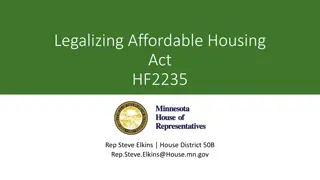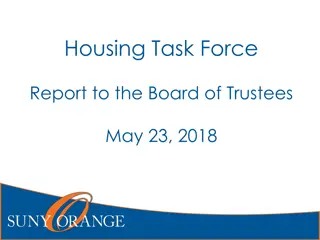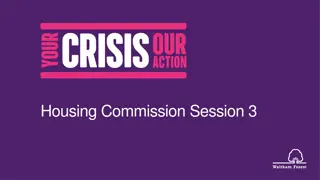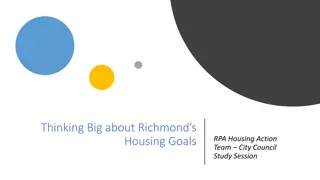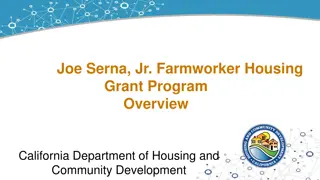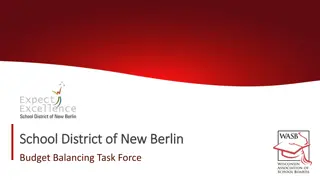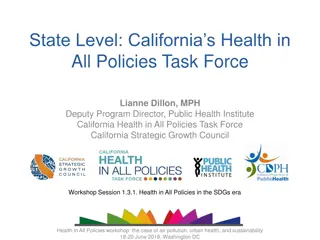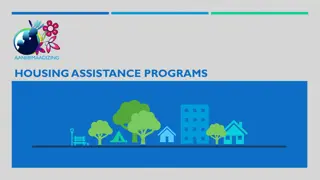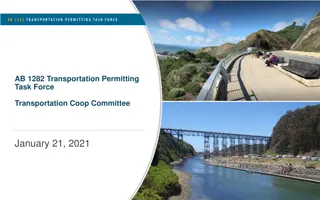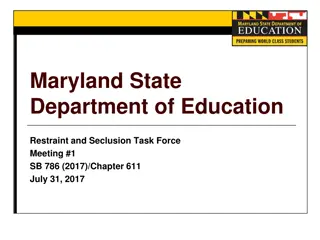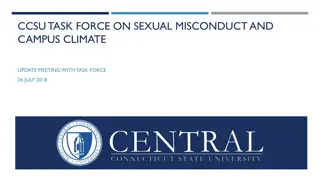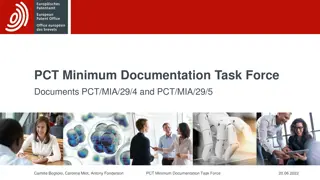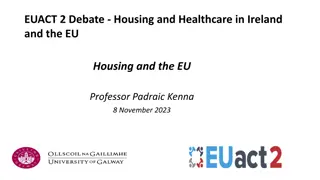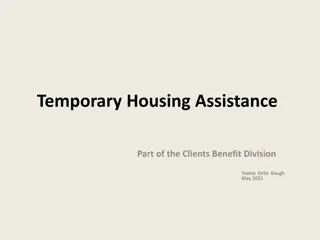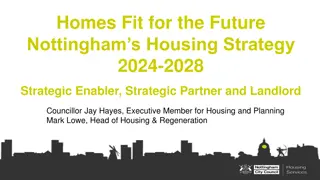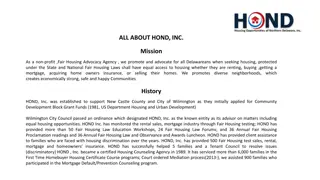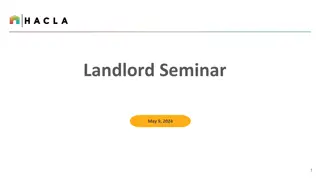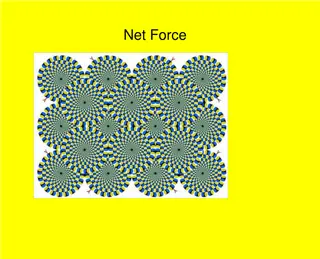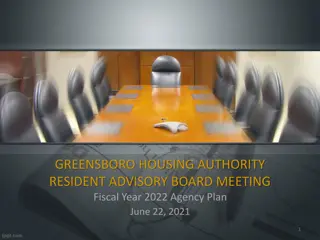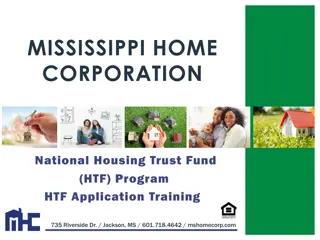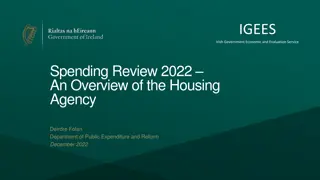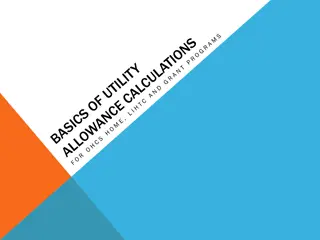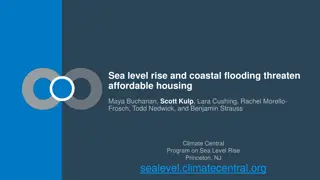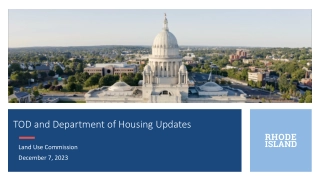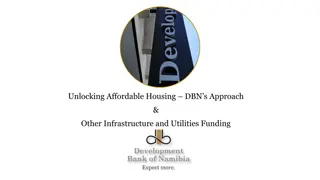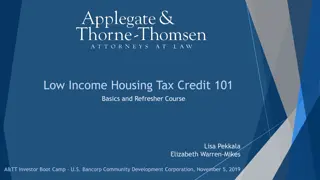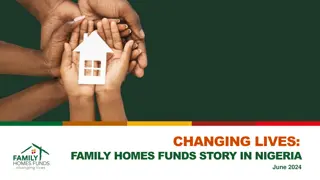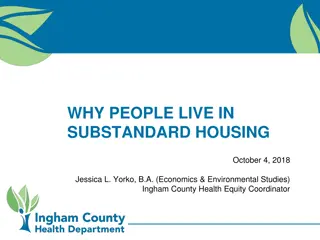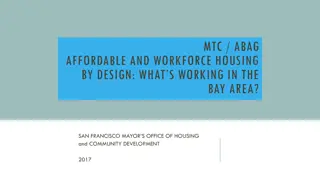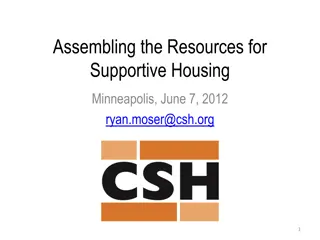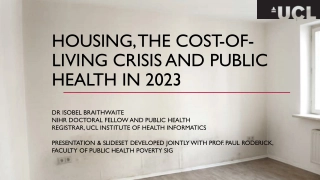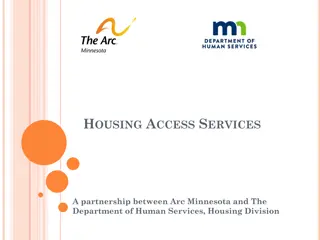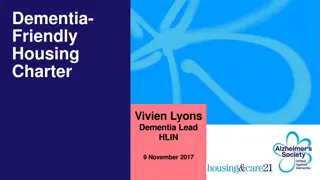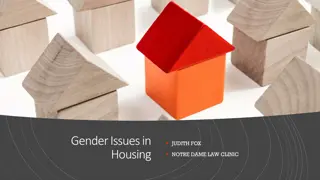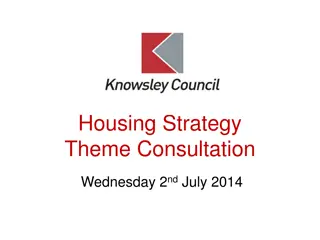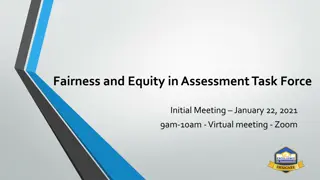Affordable Housing Transformation Task Force Overview
Comprehensive overview of the Affordable Housing Transformation Task Force and its subpanels, highlighting key members, legislative agenda, and initiatives such as the American Rescue Plan Act of 2021. The task force aims to address housing challenges and homelessness through funding, legislation, and policy recommendations, featuring a diverse panel of experts and stakeholders.
Download Presentation

Please find below an Image/Link to download the presentation.
The content on the website is provided AS IS for your information and personal use only. It may not be sold, licensed, or shared on other websites without obtaining consent from the author. Download presentation by click this link. If you encounter any issues during the download, it is possible that the publisher has removed the file from their server.
E N D
Presentation Transcript
Cathy Alderman Cathy Alderman Chief Communications and Public Policy Officer Colorado Coalition for the Homeless calderman@coloradocoalition.org
AGENDA AGENDA Affordable Housing Transformational Task Force and SubPanel Pre- session work Housing Funding Legislation from 2022 Session HB22-1304, SB22-159, HB22-1282, SB22-160, HB22-1051, SB22-156, SB22-232 Homelessness Legislation from 2022 Session HB22-1377, HB22-1378, SB22-211, HB22-1083 Housing Protection Legislation from 2022 Session HB22-1102, HB22-1082 Questions / Discussion
American Rescue Plan Act of 2021 (ARPA) American Rescue Plan Act of 2021 (ARPA) HB21-1329 required the Executive Committee of the Legislative Council, by resolution, to create a task force to meet during the 2021 interim and to issue a report with recommendations to the general assembly and the Governor on "policies to create transformative change in the area of housing using money the state receives from ARPA. $500m ($100m transferred immediately and $400m for Task Force/SubPanel process) Funds must be obligated by December 31, 2024 and expended by December 31, 2026.
Affordable Housing Transformational Task Force Affordable Housing Transformational Task Force Members Members CHAIR, Representative Dylan Roberts Rick Garcia, ED of Department of Local Affairs VICE CHAIR, Senator Julie Gonzales Alison George, Director of Division of Housing Senator Jeff Bridges Chantal Unfug, Director of Division of Local Government Senator Dennis Hisey Kristin Toombs, Director of Office of Homeless Initiatives Senator Rachel Zenzinger Cris White, ED and CEO of Colorado Housing and Senator Rob Woodward Finance Authority Representative Andres Pico Will Toor, ED of Colorado Energy Office Representative Iman Jodeh Representative Steven Woodrow Representative Dan Woog
Affordable Housing Transformational Task Force Affordable Housing Transformational Task Force Subpanel Members Subpanel Members CHAIR, Brian Rossbert, Housing Colorado (Nonprofit Housing Advocacy) Kinsey Hasstedt, Enterprise Community Partners (Non-profit Housing Expertise) VICE CHAIR, Cathy Alderman of the Colorado Coalition for the Homeless (Homelessness Expertise) Tamara Pogue, Summit County Commissioner (Commissioner of Local Government) Aaron Miripol, Urban Land Conservancy (Land Trust) Adam Paul, Lakewood Mayor (Mayor of Local Government) Roberto Rey, AARP (Housing for seniors and people living with disabilities) Tawny Peyton, Rocky Mountain Home Association (Factory-Built Housing Expertise) Wanda Harrison , The Second Chance Center (Homelessness Expertise) Andrew Hamrick, Colorado Apartment Association (Property Manager and Landlords) Eric Leveridge, Colorado Jobs with Justice (Representing Workers) Paul Weissman, Lument (Housing Financing) Steven Cordova, Tri-County Housing Authority (Local Housing Authority) Karl Koebel, Koebel & Co. (For-profit Housing) Julie Piepho, Adams Bank & Trust (Real Estate Market and Transactions)
Allowable Uses of ARPA Dollars Allowable Uses of ARPA Dollars 1. The permissible uses of money allocated to the state for housing purposes under ARPA Services to address homelessness such as supportive housing, and to improve access to stable, affordable housing among unhoused individuals; Affordable housing development to increase the supply of affordable and high-quality living units; and Housing vouchers, residential counseling, or housing navigation assistance to facilitate household moves to neighborhoods with high levels of economic opportunity and mobility for low-income residents, to help residents increase their economic opportunity and reduce concentrated areas of low economic opportunity. 2. Populations, households, or geographic areas disproportionately impacted by COVID 3. Assessing whether a program or service "responds" to COVID requires the recipient to: Identify a need or negative impact of COVID; and Identify how the program, service, or other intervention addresses the identified need or impact.
SubPanel SubPanel - - Strategic Priorities Strategic Priorities Expand capacity Development of more housing Align subsidies/vouchers Prepare Communities to make use of funding Stabilize existing affordable housing Emergency assistance Preservation / Rehabilitation Long-term affordability Strengthen the safety net Homelessness resolution/Prevention Integration of systems and resources Ensure equity and access Prioritize historically and disproportionately impacted households
Funding Recommendations Funding Recommendations Low End High End Revolving Loan Fund: New and Existing Capacity Gap financing (5-7.5%) Maintain existing affordable housing (4.5-6.5%) Governor s priority: Green Energy for AH $150M (37.5%) $222M (55.5%) Nonprofit and Local government Grants Gap financing (5-7.5%) Maintain existing affordable housing (4.5-6.5%) Sustainable rental assistance (4-6%) Governor s priority: Strong Communities Governor s priority: Green Energy for AH $150M (37.5%) $222M (55.5%) Resident Owned Communities, Mobile Home Parks, and Land- Banking Property Conversion for Transitional or Long-Term housing * $35M (8.75%) $0M (0%) $51M (12.75%) $0M (0%)
Funding Recommendations Cont. Funding Recommendations Cont. Low End High End Permanent Supportive Housing and Supportive Services Fund * Behavioral Health Transformational Task Force and Task Force on Economic Recovery Relief Cash Fund may provide $254M $0M (0%) $0M (0%) Modular Housing In combination with Governor s priority: Innovative Housing Incentive Program $40M (10%) $48M (12%) CHFA Missing Middle Access Program Governor s priority $35M (8.75%) $51M (12.75%) $400M (100%) $568M (142%) Totals
Policy Recommendations Policy Recommendations Consensus Items Consensus Items 1. Expand the State Tax Credit Program 2. Establish a Standing or Interim Committee or Task Force on Housing and Homelessness Provide Funding for DOLA Division of Housing to Update and Expand a Statewide Housing Needs Assessment Ensure Sustainable Funding for Supportive Services, and Integration with Affordable Housing 3. 4. 5. 6. Short-Term Rentals Statewide Homelessness Prevention and Resolution AHTTF Final Report
Housing Investment Legislation 2022 Housing Investment Legislation 2022 HB22-1304: State Grants Investments Local Affordable Housing - $178M for two grant programs SB22-159: Revolving Loan Fund Invest Affordable Housing - $150M for loans HB22-1051: Modify Affordable Housing Tax Credit - Extends $10m annual credit to December 2031 HB22-1282: Innovative Housing Incentive Program - $40M for innovative manufacturing SB22-146: Middle Income Access Program Expansion - $25M for existing CHFA program SB22-160: Loan Program Resident-Owned Communities - $35M for loans HB22-1117: Use of Local Lodging Tax Revenue specifically for housing SB22-232: Creation of Middle-Income Housing Authority
HB1304 HB1304 Transformational Affordable Housing Grant Program Transformational Affordable Housing Grant Program Total allocation: $138 Million NOTE: Until Dec. 31, 2023, half of available grant funds will only be accessible to applicants in rural or rural resort counties, and half to those in urban counties. Starting Jan. 1, 2024, entities can apply for remaining funds regardless of their location. Administered by: State Division of Housing (DOH) Who can apply: Nonprofit organizations doing any of the activities that grant funds can support Local governments Uses include: Infrastructure development Gap financing for tax credit development Construction costs for new housing development (rental and for-sale) Rehabilitation or preservation of existing affordable housing, Financing energy efficiency improvements Land acquisition Supportive housing and services Property conversion or transitional housing Time-limited rental assistance Eviction legal defense Land banking/community trusts Funding deadlines: Dec 30, 2024: All grants must be contracted out by DOH Dec. 30, 2026: Funds must be expended by grantees (not specified by legislature, but expect DOH to state this to follow U.S. Treasury guidelines AMI Limits: Rental Housing Urban county: up to 80% AMI Rural county: up to 140% AMI Rural Resort county: up to 170% AMI Homeownership AMI Limits: up to 140% AMI
HB1304 HB1304 Affordable Housing Priorities Affordable Housing Priorities Represents a one-time funding proposal with minimal or no multi-year financial obligations Will contribute to the overall well-being and professional and recreational needs of the local work force and population Provide for mixed-income development capped at the area identified median income levels wherever the proposed project is located Promotes long-term affordability Creates opportunities for families intergenerational wealth building Transit-oriented development Involves purchasing/securing land for future development Restricts units for survivors of domestic violence or sexual assault, and people living with disabilities including through universal design
HB1304 HB1304 Infrastructure and Strong Communities Grant Program Infrastructure and Strong Communities Grant Program Total allocation: $40 Million Administered by: State Division of Local Government (DLG) A multiagency group of DLG, the Colorado Energy Office, and the State Department of Transportation will work with stakeholders to create a list of sustainable land use best practices to help achieve the program s goals Who can apply: Local Governments defined as a municipality, county, or city and county Grant amounts: No max award amounts set by the legislature; DOH could decide to establish limits Funding deadlines: Dec. 30, 2026: Funds must be expended by grantees (not specified by legislature, but expect DOH to state this to follow U.S. Treasury guidelines) Uses include: Planning, engineering, infrastructure and local capacity. Infill development, Sustainable land use practices, Grants must, at least in part, fund infrastructure projects that increase affordable housing in or adjacent to a downtown area, a core business district, transit-oriented development, or with onsite early childhood care and education, A portion of any grant may be used for project delivery, planning, community engagement Flexibility will be given to rural communities to address local needs that are compatible with the underlying goals of the grant program (i.e., expanding the supply of affordable housing) DOLA and other agencies can use funding for education and technical assistance AMI Limits Rental Housing: up to140% AMI Homeownership AMI Limits: Rural Resort county: up to 160% AMI Urban and Rural counties: up to 140% AMI
HB1304 HB1304 Infrastructure and Strong Communities Priorities Infrastructure and Strong Communities Priorities Enabling ADUs or use of multiplexes by right in residential zones Zoning for mixed-use higher density development in downtown areas of municipalities and around transit stations Annexation policies Intergovernmental agreements that coordinate future development Reduced parking requirements Relaxed occupancy rules Budgeting policies Planned unit development with integrated affordable housing units Development of small square footage residential unit sizes Water rate structures Road standards Hazard risk reduction and mitigation standards Energy efficient building codes Zoning for innovative housing, including modular, manufactured, and prefab Use of vacant publicly owned land within local govt for development of affordable housing Any other practice deemed innovative by a local government and approved by multi-agency working group
SB159 SB159 Revolving Loan Fund Invest Affordable Housing Revolving Loan Fund Invest Affordable Housing Uses include: Infrastructure tied to affordable housing development Gap financing for LIHTC and State Affordable Housing Tax Credit Acquisition or conversion of existing affordable housing, MF development, land, buildings -- especially in communities that have implemented some statue/regs to encourage affordable housing, or where there are low concentrations of affordable housing New affordable for-sale housing costs, including construction, land acquisition, tap fees, building permits, impact fees Preserving existing affordable housing, including publicly funded housing, remediating condemned properties, weatherization, converting short-term rentals to long-term housing Housing for older adults and people living with disabilities Land acquisition for affordable housing Property conversion and adaptive reuse Permanent supportive housing Financing energy improvements in affordable housing Creating permanently or long-term affordable homeownership opportunities Total allocation: $150 Million Not ARPA funds Administered by: State Division of Housing (DOH) DOH can contract with qualified third-party loan administrators to assist in making loans DOH may also work with the Colorado Housing Finance Authority to administer Who can apply: Nonprofit organizations doing any activities that may be supported by a loan For-profit developers Local Governments defined as a county, municipality, city and county, tribal government, special district, school district, district, or housing authority Political subdivisions of the state No Deadline DOH and any other administrators must maintain the goal of generating enough return on investment to continue the program past its initial round and to future loans AMI Limits Loans must offer flexible terms and low-interest, below-market rates DOH must notify communities who have faced barriers to more traditional resources of this loan fund and encourage them to apply DOH and any other administrator should support innovative funding mechanisms that will allow funds to move quickly and foster "rapid reuse Rental Housing: Rural Resort counties: up to 140% AMI Urban and Rural counties: up to 120% AMI Homeownership: Rural Resort counties: up to 160% AMI Urban and Rural counties: up to120% AMI
SB159 SB159 - - Priorities Priorities Provide for mixed-income development capped at the area identified median income levels wherever the proposed project is located Are located in or serving communities facing barriers to accessing capital from traditional sources, have suffered significant negative financial or other impacts resulting from COVID pandemic, or are otherwise underserved Align with other state economic development efforts Create permanently affordable home ownership opportunities Ensure long-term affordability of any funded project Include units restricted for people living with disabilities or featuring universal design Highly energy efficient or high-efficiency electric equipment
Other Task Force Other Task Force SubPanel SubPanel Related Bills Related Bills HB1282 Innovative Housing Loan Program Total allocation: $40 Million Administered by: State Office of Economic Development & International Trade (OEDIT), which may contract with qualified third-party entities to administer the program, including CHFA Who can apply for loans: New or existing housing businesses in Colorado with 500 or fewer employees that create manufactured, prefab, or 3D-printed houses; kit homes; tiny homes; other housing types determined "innovative by OEDIT Incentives for grants: OEDIT will determine, may include affordability and installing homes in underserved areas of CO Considerations for successfully funded projects include: Willingness to dedicate a share of homes for a nonprofit, public housing authority, or organization providing affordable homeownership opportunities to buy at reduced cost Producing affordable and/or energy efficient units Potential economic impact of a proposed factory, including job creation SB160 Mobile Home Park Resident Empowerment Loan Program Total allocation: $35 Million Administered by: State Division of Housing (DOH), required to contract with 2-3 qualified loan program administrators Who can apply for loans: Groups or associations of mobile homeowners (or their assignee ) seeking to purchase the parks where they live NOTE: projects from low-income communities and others that have been disproportionately impacted by the Covid- 19 pandemic will be prioritized Who can apply for grants (DOH will set aside some portion of these dollars for grants, instead of loans): Nonprofit organizations providing technical, other assistance to park residents Mobile homeowners seeking grants to maintain long-term affordability of resident-owned parks
Bills Expanding CHFA Programs Bills Expanding CHFA Programs HB1051 Affordable Housing Tax Credit Total Allocation: $10 Million Administered by: Colorado Housing Finance Authority (CHFA) in accordance with annual Qualified Allocation Plan (QAP) Authorized through: December 31, 2031 CHFA Criteria: Market conditions Proximity to other housing credit properties Readiness to proceed Financial feasibility and viability Experience/Track record of project team Project costs Site suitability CHFA Priorities: Projects serving homeless Projects serving persons with special needs Projects in counties with less than 180,000 in population SB156 Middle Income Access Program Total allocation: $25 Million Administered by: Colorado Housing Finance Authority (CHFA) Who can apply: Nonprofit and for-profit housing developers (loans are made to project developers, not directly to local governments) Funding deadlines: This loan program already exists and is intended to fund projects in perpetuity. Allowable uses: Acquisition, new construction, housing rehabilitation Production or preservation of homes affordable to households with incomes between 80-120% area median income, typically rental units
SB232 SB232 Middle Income Affordable Housing Trust Authority Middle Income Affordable Housing Trust Authority Total Allocation: $1 Million Administered By: Special Purpose Authority A board of directors (14) composed of appointees by the governor with the consent of the senate Deadlines Board appointments by September 1, 2022 The board must solicit project proposals by April 2023 with selections by July 1, 2023 AMI Targets Urban and Rural: 80%-120% Rural Resort: 80%-140% Authority: To exercise the powers necessary to acquire, construct, rehabilitate, own, operate, and finance affordable rental housing projects, including but not limited to: Issue bonds in connection with its affordable rental housing projects payable solely from revenues from affordable rental housing projects and with no recourse to the state; Enter into public-private partnerships and to contract with experienced real estate professionals to develop and operate affordable rental housing projects; Employ its own personnel or contract with public or private entities, or both, for services necessary or convenient to the conduct of all of the authority's activities; Provide assistance to tenants in its rental housing to enable a transition to home ownership; and To establish one or more controlled entities to carry out its activities.
SB232 SB232 Middle Income Affordable Housing Trust Authority Middle Income Affordable Housing Trust Authority Guardrails Achieved: Annual Audit, Quarterly reporting, and 3-year review (added in much more robust reporting elements including impact on local market) Limit to pilot of no more than 3500 units AMIs set by CHFA+ and not Board Removing Heritage Neighborhood definition Limit Developer Fees less than private sector and require diversity in applications At least 60% of units available at targeted AMIs Promote mixed income development Comply with local inclusionary ordinances 3 stages of local government review Below market rents (10%) No short-term rentals Cannot combine with ARPA funds or tax credits Cannot use funds to acquire LIHTC or USDA 515 properties Upon sale, notice to government entities and removal of tax exemption Concerns: Timing of proposal Impact on current housing market and rents AMI targeting Long-term affordability assurances Controlled Entity Impact on Local Tax Revenue Board Composition Financing Requirements Risk Mitigation Plans
Homelessness Legislation Homelessness Legislation HB22-1377: Grant Program Providing Responses to Homelessness $105M for local homelessness projects HB22-1378: Denver-metro Regional Navigation Campus Grant $50M grant to local government for creation/operation SB22-211: Repurpose the Ridge View Campus $45M for campus transition HB22-1083: Homeless Contribution Income Tax Credit
HB1377 HB1377- - Grant Program Providing Responses to Homelessness Grant Program Providing Responses to Homelessness Total allocation: $105 Million Administered by: State Division of Housing (DOH) Who can apply: Nonprofit organizations Local Governments NOTE: Applicants must provide a match in money or other resources Funding deadlines: Dec 30, 2024: All grants must be contracted out by DOH Dec. 30, 2026: Funds must be expended by grantees Allowable uses: Permanent supportive housing Supportive services Other housing development and homelessness response programs including: Recovery care Vocational services Shelter or transitional housing Outreach support $5 Million reserved for: Outreach and education Data collection and system integration
Other Homelessness Funding Legislation Other Homelessness Funding Legislation HB1378 Denver Metro Regional Navigation Campus Grant Total Allocation: $50 Million Administered By: Division of Housing Who Can Apply: Local Government in Denver or Community Partner Use: To build or acquire, and then facilitate, a regional navigation campus to respond to and prevent homelessness. Behavioral Health services, medical care, vocational services, housing, shelter, benefits assistance, case management, life skills training, housing navigation Deadline: Money to be spent by December 30, 2026 SB211 Repurpose the Ridge View Campus Total Allocation: $45 Million Administered By: Division of Housing (upon transfer from Human Services and in cooperation with Behavioral Health Administration and HCPF) Use: Ridge View campus to be repurposed and converted into the Ridge View Supportive Residential Community to provide transitional housing, a continuum of behavioral health service treatment, medical care, vocational training, and skill development for its residents and the general public.
HB1083 HB1083 Homelessness Contribution Tax Credit Homelessness Contribution Tax Credit Upgrades and enhances the current enterprise zone contribution tax credit that is used to support organizations that serve people experiencing homelessness. Benefits of this improvement include: Making the credit available to providers statewide; Expanding the types of homeless services that are eligible to include street outreach, homelessness prevention, and emergency shelter programs; Incentivizing donations to providers in rural and distressed areas; Streamlining the administration of the credit. Credit Attributes: To be administered by DOH starting January 1, 2023 (DOH will release qualifying projects 11-1-2022 and every year thereafter) Tax credit is equal to 25% of the total contribution to the qualifying organization Capped at $100,000 per taxpayer annually The credit is 30% for rural/distressed areas Capped at $750,000 in contributions per income tax year for the nonprofit organization
Housing Protections Legislation Housing Protections Legislation HB22-1102: Veterans And Military Status in Fair Housing Adds veteran and military status as protected class in Fair Housing Statute HB22-1082: Establish Fair Housing Unit Department of Law Expands enforcement of state housing laws: - Security Deposits - Consideration of Criminal History on Rental Applications - Late Fees - Notice and Frequency of Rent Increases - Immigrant Tenant Protection Act - Mobile Home Park Act
Questions? Questions? Cathy Alderman Chief Communications and Public Policy Officer Colorado Coalition for the Homeless calderman@coloradocoalition.org


